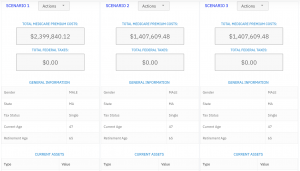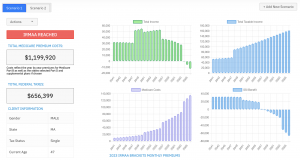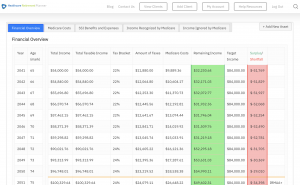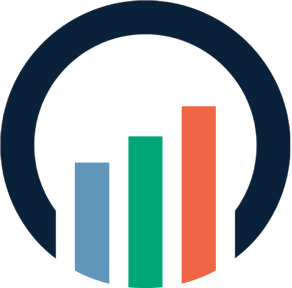Imagine standing at the crossroads of retirement, with your heart set on making those golden years truly shine. You’ve got dreams to chase and hobbies to explore but there’s a lingering question in your mind – what income is used to determine medicare premiums?
Your road map for navigating this crucial phase hinges heavily on understanding how Medicare works. Just like mastering a new skill or deciphering a challenging puzzle, grasping the ins and outs of Medicare requires patience, diligence, and knowledge.
Intricate yet vital details such as Modified Adjusted Gross Income (MAGI), its components including total gross income and certain non-taxable Social Security benefits play starring roles in calculating your potential Medicare premium payments. Get ready to uncover effective strategies that could help you lower these costs by leveraging things like retirement accounts or Health Savings Accounts (HSAs).
With each step, we strive to deliver excellence. As we traverse this journey, it is essential to savor the experience and glean insights from it. This is our ethos at work.
Understanding Medicare Premiums and Income Calculation
The cost of your Medicare premium is not a fixed cost. The cost of your Medicare premium may not be constant and can depend on several elements, one being income. Understanding the role that your earnings play in determining these premiums can help you effectively plan for retirement.
The Role of Income in Determining Medicare Premiums
The MAGI is used to calculate premiums for both Parts B and D of Medicare, with those earning more contributing proportionally more. Specifically, the Modified Adjusted Gross (MAGI) influences both Parts B and D premiums. This system works to ensure those with higher incomes contribute more towards their healthcare costs.
In 2023, individuals earning an annual income of $97,000 or less paid a standard premium amounting to $164.90 for Medicare Part B. However, this isn’t just any old flat fee; it’s linked directly to inflation rates as well as federal budget considerations.
Breaking Down the Components of MAGI
To properly plan out potential Medicare expenses during the retirement planning phase, it’s crucial to understand what constitutes MAGI. In simpler terms, MAGI calculation includes total gross income plus certain non-taxable Social Security benefits along with other bonus additions like tax-exempt interest from municipal bonds, etc. The sum then helps determine if an IRMAA surcharge will be applied, thus increasing monthly payments. Therefore, knowing about such nuances beforehand might save unexpected hikes later on.
If all this talk about adjusting and modifying has got you scratching your head, don’t worry. You’re not alone – there are many resources available including SmartAsset’s free retirement calculator to help you figure out what your MAGI might be.
Remember, knowledge is power. Understanding how income impacts Medicare premiums allows for effective retirement planning and can lead to a more financially secure future. So let’s keep the conversation going. In subsequent sections, we’ll dive deeper into strategies for lowering income in regards to Medicare premium calculations and how higher incomes affect these costs.
Key Takeaway:
Know Your Numbers: Medicare premiums aren’t one-size-fits-all. They’re influenced by your Modified Adjusted Gross Income (MAGI), meaning higher earners pay more for healthcare. To effectively plan for retirement, get familiar with what makes up your MAGI and use tools like SmartAsset’s free calculator to estimate future costs.
How Your Tax Return Influences Your Medicare Premiums
You might be wondering, “What does my tax return have to do with my Medicare premiums?” Well, it’s all about your Modified Adjusted Gross Income (MAGI). The Social Security Administration uses information from the tax return you filed two years prior to determine your income-related monthly adjustment. So, in simpler terms, what you earned two years ago directly affects what you pay for Medicare today.
But why is this so? In an effort to balance out the costs of healthcare among beneficiaries based on their financial means, lawmakers decided that individuals earning more should bear a slightly heavier burden. Hence, they devised premium calculations that vary based on one’s annual income.
The Link Between MAGI and IRMAA
To understand how this works we need to first unpack these intimidating acronyms – MAGI and IRMAA. Essentially MAGI refers to total gross income including certain non-taxable social security benefits while IRMAA, which stands for Income-Related Monthly Adjustment Amount acts as an extra charge added onto Parts B and D of standard premium payments if your earnings exceed basic limits set by legislation.
Your adjusted gross gets ‘modified’ further when some normally non-taxable forms of income are included in the calculation – thus forming our key concept here: modified adjusted gross or simply put ‘MAGI’. To use a sports analogy: If determining medicare premiums was like scoring in baseball then think of AGIs as runs batted in but consider those bonus additions into consideration too.
Predicting Future Payments with Past Earnings
Now that we have an understanding of how your income is determined, let’s review the figures. Social Security uses information from the tax return filed two years prior to determine premiums. It means that if you experienced an increase in your gross income back then – maybe due to selling property or cashing out investments – brace yourself for potential Medicare premium increases.
It is essential to understand these aspects. Proper planning is crucial, especially when dealing with them.
Key Takeaway:
Your tax return from two years ago plays a big role in deciding your Medicare premiums today. This is because of your Modified Adjusted Gross Income (MAGI) and the Income-Related Monthly Adjustment Amount (IRMAA). Basically, if you earned more two years back, expect to pay more for Medicare now. It’s all about balancing healthcare costs based on what you’re able to contribute given your past income.
The Impact of Higher Incomes on Medicare Premiums
Many people are surprised to learn that higher income can increase your Medicare premiums. This is because, for some beneficiaries, there’s a potential ‘Medicare tax’ known as the Income-Related Monthly Adjustment Amount (IRMAA).
This surcharge affects both Parts B and D of Medicare. It works by increasing premiums incrementally based on Modified Adjusted Gross Income (MAGI). So if you’re among those with incomes above $103,000 for individuals or $206,000 for married couples filing jointly in 2023 (Enrollment Information for People New to Medicare), be prepared – you’ll need to pay more.
Moving Up The IRMAA Ladder
In simpler terms, think about IRMAA like moving up a ladder: each rung represents an increased income bracket. As you climb higher due to increased incomes over the basic limits set by Social Security Administration (SSA), so does your premium payment.
The SSA uses information from your tax return filed two years prior when determining these brackets (Calculate Your Capital Gains Tax). That means this year’s earnings could impact what you owe in future years.
Busting Myths About Fixed Cost And Standard Premiums
A key concept here is that while many believe Medicare operates at a fixed cost or standard premium regardless of one’s total gross income; it doesn’t. Instead, premiums vary based on MAGI which includes all forms of taxable and non-taxable income – yes even social security benefits.
To clarify further – take into account this stat: For Part B coverage alone in 2023, individuals with an annual income of $97,000 or less paid a standard premium of $164.90.
When Income Takes You to the Highest Tier
Those making more than half a million dollars annually will be taken aback by the Part B premium cost of $560.50 per month. Their Part B premium jumps to an astonishing $560.50 per month.
Key Takeaway:
to see a hike in your premiums. The ‘Medicare tax’, or IRMAA, takes into account your Modified Adjusted Gross Income (MAGI). It impacts Parts B and D of Medicare by progressively increasing the cost based on your income level. So if you’re earning more than $103,000 individually or $206,000 as a couple in 2023 – brace yourself for higher costs.
Strategies to Lower Your Income for Medicare Premium Calculations
The key concept here is that your Medicare premiums are based on your income, specifically the Modified Adjusted Gross (MAGI). Let’s explore how to effectively manage your MAGI figure with retirement planning strategies.
Leveraging Retirement Accounts
If you’re still earning, increasing contributions to retirement accounts like 401(k)s or IRAs could be an ace up your sleeve. By doing so, you reduce your MAGI and potentially decrease the amount of income used in premium calculations.
A bonus addition: these extra savings work towards securing a more comfortable future. But remember, it’s crucial not just to plan but properly plan – working with a vetted financial advisor can make all the difference.
The Role of Health Savings Accounts (HSAs)
An HSA isn’t just another way of paying premiums; it has tax advantages too. Money invested in HSAs reduces current year gross income and consequently lowers potential Medicare premiums. It might sound like magic, but it’s just good financial planning.
You needn’t be a wizard or have any secret knowledge – anyone eligible for high-deductible health plans can start one. If we were playing “Financial Advisor Bingo,” opening an HSA would surely be on every card.
So how does this help? Well,
- In simpler terms: The less money appearing as ‘income,’ the lower expected medicare premium payment will likely be.
- This works because MAGI includes total gross income plus non-taxable social security benefits and other amounts which collectively affect what tier of costs you fall into when determining Medicare premiums.
- By managing these factors, you can make sure your premiums don’t increase incrementally as income increases.
These are just a couple of strategies that could help reduce the amount used to calculate Medicare premiums. Remember, financial planning is like trying to hit a moving target – what works today might not be as effective tomorrow.
It appears that we have only just begun.
Key Takeaway:
Managing your Medicare premiums revolves around understanding and adjusting your Modified Adjusted Gross Income (MAGI). Tactics like increasing contributions to retirement accounts or investing in Health Savings Accounts can lower this figure, potentially reducing your premiums. But remember, good financial planning is a dynamic process that may need tweaking over time.
Understanding the IRMAA Surcharge and Its Impact on Your Premiums
If you’ve been puzzled by your Medicare premiums, there’s a key concept that might clear things up: The Income-Related Monthly Adjustment Amount (IRMAA). This is not some obscure acronym, but rather an important part of how Medicare works. MAGI or Modified Adjusted Gross Income plays a significant role in this calculation.
MAGI includes total gross income along with certain non-taxable Social Security benefits. Think of it as your financial footprint that lets Uncle Sam know where you stand economically.
The Tiers That Bind – And Sometimes Sting.
Medicare Part B premiums increase incrementally based on one’s MAGI. It all starts when individuals earning above $97,000 step into the arena. For them, standard premium charges begin to look like yesterday’s news.
The highest tier hits those who earn $500K+, for whom the monthly surcharge comes out to be a whopping $560.50. Imagine buying 280 cups of fancy lattes each month; yes, that’s what we’re talking about here.
Social Security Benefits and their Role in All This
You may think your non-taxable social security benefits are playing hide-and-seek from these calculations – well think again. These sneaky numbers find their way into determining your MAGI which ultimately impacts whether you’ll have more bucks flying out towards Medicare premium payments every month or not.
Taming The IRMAA Beast – Is It Possible?
Affirmative. With proper planning and smart strategies at play such as increasing contributions to retirement accounts or investing in Health Savings Accounts (HSAs), you can influence your MAGI. This way, you not only grow a nest egg for your golden years but also potentially lower the IRMAA surcharge.
Retirement planning isn’t just about sipping margaritas on a beach somewhere (although that sounds great.). It’s also about understanding how these seemingly small things collectively affect our retirement income and quality of life.
Key Takeaway:
Understanding your Medicare premiums can feel like solving a puzzle, but knowing about the Income-Related Monthly Adjustment Amount (IRMAA) and Modified Adjusted Gross Income (MAGI) can help. Your MAGI influences IRMAA surcharges on your premium – with higher earnings leading to increased costs. But don’t despair. Smart planning such as increasing retirement contributions or adjusting income through other financial strategies may lessen these charges, making managing healthcare expenses less of a headache.
How Social Security Benefits Influence Your Medicare Premiums
Pondering, “What’s the link between my social security benefits and Medicare premiums?” It’s all linked to your Modified Adjusted Gross Income (MAGI).
The Interplay Between Social Security and MAGI
MAGI isn’t just a term from an old story about three wise men. It stands for Modified Adjusted Gross Income, a key concept that impacts your expected Medicare premium payment. And yes, Social Security benefits play their part.
In simpler terms, MAGI includes total gross income – think wages or earnings from investments – but also some non-taxable items like untaxed foreign income or tax-exempt interest. And you guessed it right. Certain non-taxable Social Security benefits too.
When Non-Taxable Becomes Taxable: The Irony of Life.
A curious twist here is that although these social security benefits are ‘non-taxable’, they’re included in the MAGI calculation used to determine medicare premiums. So essentially what was once tax-free now has potential implications on your pocketbook.
If this feels like being stuck in traffic only to find out there wasn’t any construction work going on after all…well welcome to retirement planning 101. But don’t worry – understanding how this works can help with effective retirement planning strategies later down the line.
Busting Myths: Not All Benefits Are Created Equal
All social security benefits aren’t treated equally when determining your MAGI for premium calculations purposes though. While some specific non-taxable ones do affect the equation others such as Supplemental Security Income (SSI) don’t factor into it at all.
- SmartAsset’s free retirement calculator can help you figure out the impact of different income sources on your Medicare premiums.
- You could also use a Capital Gains Tax Calculator to estimate potential tax liabilities from investments, another component of MAGI.
Key Takeaway:
Even though they’re ‘non-taxable’, these benefits still influence your MAGI and can affect how much you pay for Medicare premiums. But remember, not all social security benefits have the same impact on your MAGI.
FAQs in Relation to What Income is Used to Determine Medicare Premiums
What income is counted for Medicare premiums?
Your Modified Adjusted Gross Income (MAGI), which includes total gross income and certain non-taxable Social Security benefits, determines your Medicare premium.
What income level triggers higher Medicare premiums?
If you’re earning above $103,000 as an individual or $206,000 as a married couple, expect to pay more for your Medicare Parts B and D premiums.
What income is used for Medicare Part B?
MAGI impacts the cost of Part B. This combines your taxable earnings with some non-taxed dollars like tax-exempt interest and untaxed Social Security funds.
What income is used to determine Medicare premiums 2024?
The IRS uses info from two years prior — so they’ll look at your 2023 returns in order to set 2024’s rates.
Conclusion
Grasping the concept of what income is used to determine Medicare premiums, you now know that your Modified Adjusted Gross Income (MAGI) plays a crucial role. MAGI includes not just total gross income but also certain non-taxable Social Security benefits.
Recognizing how higher incomes can increase Medicare premiums incrementally gives you an edge in planning effectively for retirement. And knowing about IRMAA surcharges allows you to better anticipate potential increases in premium payments.
Acknowledging strategies like increasing contributions to retirement accounts or investing in Health Savings Accounts helps keep those costs down. You’re equipped with actionable knowledge that empowers effective retirement planning and safeguards your golden years from unexpected healthcare expenses.
Table of Contents:
- Understanding Medicare Premiums and Income Calculation
- How Your Tax Return Influences Your Medicare Premiums
- The Impact of Higher Incomes on Medicare Premiums
- Strategies to Lower Your Income for Medicare Premium Calculations
- Understanding the IRMAA Surcharge and Its Impact on Your Premiums
- How Social Security Benefits Influence Your Medicare Premiums
- FAQs in Relation to What Income is Used to Determine Medicare Premiums
- Conclusion
Streamlining the Medicare Surcharge Calculation Process.
Our Healthcare Retirement Planner software is designed to streamline the retirement planning process for financial professionals. By providing an efficient way to calculate IRMAA costs, our tool helps you save time and focus on other aspects of your clients’ retirement plans.
- Faster calculations: Our software quickly calculates IRMAA costs based on your client’s income and tax filing status, eliminating manual calculations and potential errors.
- User-friendly interface: The intuitive design of our platform makes it easy for financial professionals to input data and generate results with minimal effort.
- Data integration: Seamlessly integrate our calculator into your existing financial planning tools or CRM systems for a more streamlined workflow.
- Easy to Understand Reports: Export reports to easily share with your clients
- Tax and Surcharge Modeling: see how different types of income affects both taxes and your surcharges.
In addition to simplifying the calculation process, using our Healthcare Retirement Planner can also help improve communication between you and your clients. With clear visuals that illustrate how IRMAA costs impact their overall retirement plan, you can effectively convey complex information in an easily digestible format. This enables clients to make informed decisions about their healthcare expenses during retirement while ensuring they are prepared for any potential changes in Medicare premiums due to income fluctuations. To learn more about how our software can benefit both you as a financial professional and your clients’ retirement planning experience, visit the features page. Streamlining retirement planning processes can help financial professionals save time and resources, allowing them to focus on other areas of their clients’ needs. Automated calculation of IRMAA costs is the next step in streamlining this process even further.





